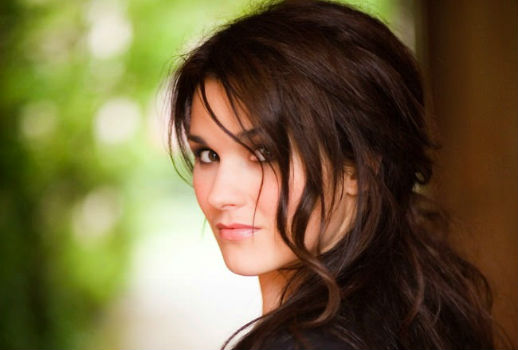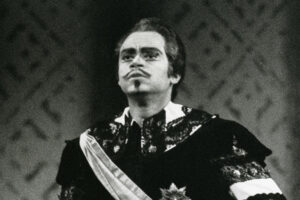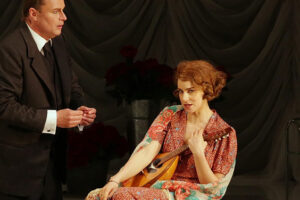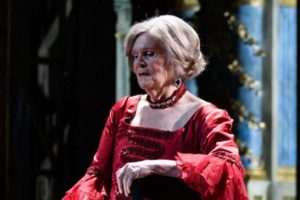

She recently debuted at the Met as Elvira in Bellini’s I puritani, yet it was the genre’s other two pillars—Rossini and Donizetti—whose works she tackled in concert with the Orchestre de chambre de Paris conducted by Manuel López-Gómez at the Théâtre des Champs-Élysées. She was joined by another energetic singer, tenore di grazia Dmitry Korchak.
Over the course of nearly three hours (including encores), these two relatively young singers demonstrated, at the very least, intense passion for bel canto and considerable charisma too. Yet the evening was at times hampered by what appeared to be poor communication between the conductor and the singers.
After a somewhat tentative but refined overture to Mozart’s Die Zauberflöte, Ms. Peretyatko appeared in her first of three fascinating gowns—”Parce que nous sommes à Paris,” she cooed. She launched into “Crudele ? Ah no, mio bene” from Don Giovanni and it was immediately clear that singer and conductor were not speaking the same language. Her hands clasped together, she began “conducting” at a significantly faster tempo, to which López-Gómez responded albeit after some delay. I assume she was anticipating that his slow tempo during the introduction would continue throughout the aria, making it even more difficult to sing than it already is.
Mr. Korchak also had a tentative start, singing Dalla sua pace from the same opera. It is a deceptively simple piece, which my former voice teacher told me is often used as a litmus test to determine if a young singer should venture into Tenor Territory. Much of the aria is in the passaggio, the transition area between men’s upper and lower registers. I found Korchak’s version to be somewhat unsteady, a sharp contrast to his other, more virtuosic offerings, including a tremendous “Che ascolto… Ah ! Come mai mi sento” from Rossin’s Otello, a tender if choppy “Pour me rapprocher de Marie”from Donizetti’s La Fille du régiment, and the perennial chestnut, “Una furtiva lagrima” from L’elisir d’amore.
It was especially interesting to hear Ms. Peretyatko sing a glittering “Bel raggio lusinghier” from Rossini’s Semiramide after having heard Elena Mosuc’s take on the full role at the same theatre just a couple of weeks ago. There, conductor Evelino Pidò reportedly forbade his singers from adding Joan Sutherland-llke ornamentations and high notes. (Pidò was booed by a sizable minority at this performance).
Peretyatko took a different approach, and her version of the aria might be best categorized as razzle dazzle, pushing the envelope but never crossing the boundary of good taste. Yet the aria I most enjoyed was “Regnava nel silenzio” from Lucia di Lammermoor, which proved an excellent showcase for Peretyatko’s dark timbre mixed with stellar coloratura. In addition, she sang an aria that was new to me, “Non si dà follia maggiore”from Il Turco in Italia by Rossini.
I should note that in these pieces the conducting was far more sensitive—and the Orchestre de chambre de Paris played beautifully, handling the exposed solo parts especially well. Yet I could not help but notice that Peretyatko essentially never acknowledged, let alone bowed with, López-Gómez after her arias, in contrast to many warm “secret handshakes”initiated by Korchak.
The two singers also did a number of duets and the Paris audience ate up their on-stage shtick. The duets “Fuggi, crudele, fuggi” (Don Giovanni) and “Qui di sposa eterna” (Lucia) were well sung but lacked intensity. By contrast, the two had a lot of fun with the exchange of “Voyons, écoutons, écoutons et jugeons”in “Quoi, vous m’aimez?” (Fille). An encore duet from Elisir could not help but evoke memories of Anna Netrebko and Rolando Villazon in that romp of an opera. (Comparisons between Peretyatko and Netrebko are inevitable, as they are both Russian and have dark hair, but I will avoid the topic entirely as they are entirely different performers in every sense).
In sum this was a very satisfying night of singing and was rewarded with a standing ovation, rare for Paris. Peretyatko is certainly the real deal, yet over time I hope she devotes more energy to connecting with text and character. Korchak, although perhaps he need not push his voice so much, deserves admiration for tackling this repertoire with aplomb. Perhaps a few more rehearsals with one another and with López-Gómez would have allowed all parties to be more relaxed and on the same page.
I was very lucky to experience many “nuits inoubliables” in Paris, yet the ease with which I was able to encounter established ‘stars’—Muti! Bartoli! Yo-Yo Ma!—meant that I had only a few opportunities to encounter emerging artists. So it was quite a thrill to hear sopranos Sabine Devieilhe and Andreea Soare tackle some fiendishly difficult Mozart concert arias at Citéde la Musique.
The concert was hosted by L’Academie du Festival d’Aix-en-Provence—both Devieilhe and Soare were HSBC laureates (in 2012 and 2011, respectively) at the Festival. The band for the occasion was Les Siècles, a large period ensemble led by the rather busy Franc?ois-Xavier Roth.
But before the big sing-off, we sat patiently while Les Siècles proceeded to turn Beethoven’s Seventh Symphony into something of a whirling dervish overture. I get that it is the “apotheosis of dance,” according to Wagner, and I understand the appeal of period instruments, but fast does not always mean good. It can also mean furious.
And then emerged Ms. Devieilhe—petite, posed, even introverted, but with a voice of astonishing focus and clarity. Those stratospheric high notes were precise, but I was impressed by her consistent projection throughout her range. She sang a rapturous “Vorrei spiegarvi o Dio”with smooth legato, then “No, che non sei capace”—which reminded me in many ways of “O zittre nicht.”
I should mention that Devieilhe recently made a splash as the Queen of the Night, with pointing out that she, now 29, sang the role at the identical age as a young Natalie Dessay. She then gave us a highly virtuosic “Popoli di Tessaglia… Io non chiedo,”which, interestingly enough, I first heard on Dessay’s awesome album, The Miracle of the Voice. (That aria was in fact written to be inserted into Gluck’s opera Alceste. )
Comparisons with Dessay are inevitable, but Devieilhe is unquestionably her own artist—and with none of the exasperated mannerisms of the more senior diva. Rather, Devieilhe appears remarkably focused (though this was, after all, a concert recorded for radio broadcast—December 29—and was not necessarily a time for ‘acting.’) Devieilhe—whose performance I could only summarize as “don’t try this at home singing”—is enjoying successes throughout France, and if we are lucky, she will soon cross the pond.
Ms. Soare was also mightily impressive in her two very long and complex arias, “Ah, lo previdi… Ah, t’invola” and “Bella mia fiamma, addio,”with a rich, lyric soprano voice. No surprise that she has sung roles such as Donna Elvira in Don Giovanni at Opera national de Paris. She and Devieilhe—who seemed friendly enough, hardly rivals since their repertoire definitely does not overlap—came out together at the end for a lovely “Sull’aria…che soave zeffiretto”from Le nozze di Figaro.
Devieilhe and Soare both made very strong cases for these lesser-known pieces by Mozart. And bravo to HSBC for seeing fit to invest in the next generation of singers.
I so enjoy bringing my friends to their first opera, and La Boheme remains unrivalled as the most accessible introduction to the art form. And although I have seen Puccini’s masterpiece multiple times—as well as an avant-garde “disco-opera”called Mimi —I find myself constantly intrigued by new details in Puccini’s score. Jonathan Miller’s effective production at Opera Bastille is currently enjoying an excellent revival, thanks in large part to Ana Maria Martinez’s gripping Mimi (we saw her last performance on Saturday evening) and Sir Mark Elder’s sensitive, expert conducting (without a score). And after American in Paris at Théâtre Chatelet, why not continue to explore foreigners’ depictions of the Parisian good life?
Rodolfo, the endearing, starving poet (and Pavarotti’s calling card role) was supposed to be sung by Russia’s Khachatur Badalyan but he has been replaced by a revolving door of tenors, including Piotr Beczala, who flew in solely for the opening night performance. Vittorio Grigolo takes over this week opposite Nicole Cabell. We had Dmitri Pittas, who began with a well-shaped “Che gelida manina” but ran of out steam in the final act. Dramatically he was too often non-reactive to his fellow colleagues, which is unfortunate since he is singing the role all over the world and should have a clear sense of Rodolfo’s character development.
This was my first time hearing Ms. Martinez, who hails from Puerto Rico and rose to prominence through her frequent appearances with Plácido Domingo and Andrea Bocelli. As mentioned, this was her final Mimi here and she offered some of the most tender and emotionally transparent singing I have ever heard in an opera house. She floated the word, “senza” in “Addio, senza rancor” for what felt like an eternity. It was transcendent.
The rest of the cast was fairly strong—Mariangela Sicilia as an appropriately extroverted Musetta and Tassis Christoyannis an engaging and full-voiced Marcello. Ante Jerkunica’s Colline almost stole the show with his profoundly moving monologue in the fourth act. Suddenly I thought we had been transported to Boris Godunov.
























Comments